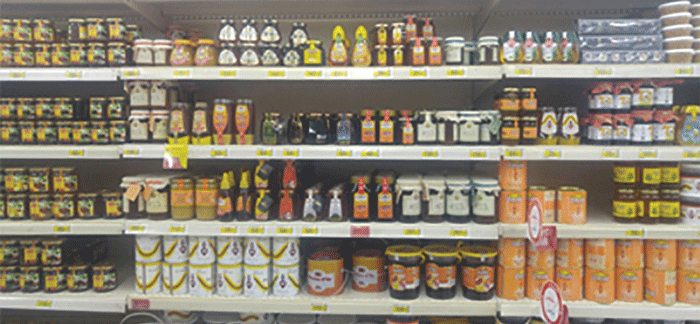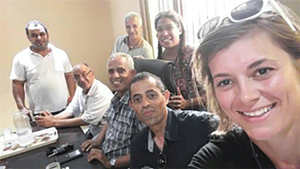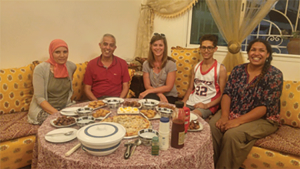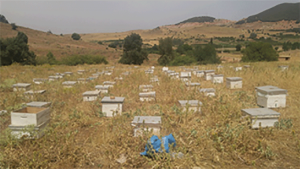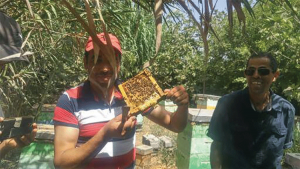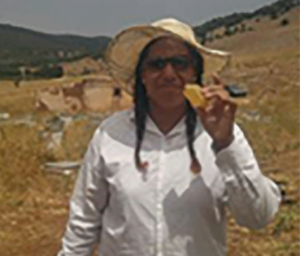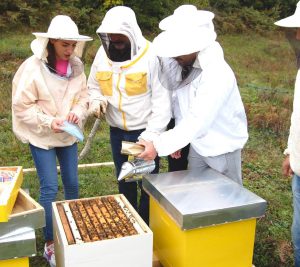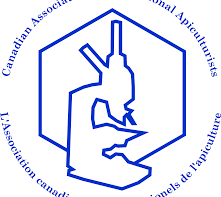By: Melanie Kirby
Morocco’s Beekeeping Is Similar To Our’s, But Their Culture Is So Different.
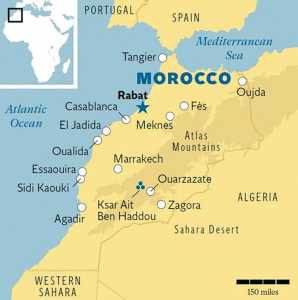 I’ve never been to this part of the world. And I had no idea what it would be like. I thought to myself, “Well, it’s July and the supers are on the bees. I would like to help. So yes, sign me up. I’ll go to the Kingdom of the West to share information with Moroccan beekeepers!”
I’ve never been to this part of the world. And I had no idea what it would be like. I thought to myself, “Well, it’s July and the supers are on the bees. I would like to help. So yes, sign me up. I’ll go to the Kingdom of the West to share information with Moroccan beekeepers!”
The invitation to travel to the jewel of north Africa originated with a newer beekeeper named Rachid El Khazerri. Though his original roots are Moroccan, 25 years ago he established his American roots in Houston, TX. Mr. El Kharrazi is a trained emergency room nurse. His long hours and intense profession assisting with one crisis after another helping to stabilize and save lives needed a more pacifying counterpoint. He and his wife Nora, who is also an emergency room nurse, decided to buy some agricultural property as a place to develop away from the hustle and bustle of their dramatic medical professions.
And like many folks who are lucky enough to have a piece of land to call their farm, he needed to keep it in active agricultural status. Being that his work hours are not conducive to keeping livestock that needs daily care, Mr. El Kharrazi began to research what he could grow on his farm. After much consideration, he decided to take up beekeeping. He knew that he would need to do some homework before getting his own bees. Lucky for him, his wife Nora was also interested in the craft of keeping bees and she enrolled in the Texas Master Beekeeper Program.
Mr. El Kharrazi, Rachid- speaks English and Arabic. And while his English is fantastic, he decided that learning tutorials online were easier for him to comprehend in his mother tongue of Arabic. So he began participating in online Moroccan beekeeping forums. As he began to learn about beekeeping, he recognized that his home countrymen could benefit from technical assistance. And this was the start of his vision to connect Moroccan and American beekeepers to share information and learn from each other.
For those unfamiliar with Morocco, it is situated on the northern ridge of Africa and is geographically characterized by a lengthy coastline along the Mediterranean Sea and the Atlantic Ocean, with the rugged Atlas and Rif mountainous terrains surrounded by immense tracts of desert. It is between Mauritania and Algeria, directly south of Spain across the Straits of Gibraltar and includes Western Sahara.
Morocco’s mystique is palpable; weaving a mosaic of ancient cultures and traditions with exotic spices, cuisine, and arts. It is a country whose cultural cornucopia is a blend of indigenous Berber, Sub-Saharan African, Arab, Spanish and French influences, and more. It has an evolving history that goes back to the beginning of time.
Interestingly, mitochondrial DNA studies discovered a close link between indigenous Berbers and the Sami of Scandinavia (the northernmost indigenous peoples of Europe). The Sami people are indigenous Finno-Ugric reindeer herders who inhabit the Arctic parts of Kola Peninsula of Russia, Finland, Sweden and northern Norway. While the Berber have been known for their nomadic camel herding.
The Berbers are a diverse people whose history is more than 4000 years old. Calling themselves Amazigh, the proud raiders, they fought against the Romans, Arab, and French invaders. Though their language is primarily oral in nature, their writing system is over 2500 years old. They have been called many names. The medieval Europeans called them Moors.
The Moroccan people, and their culture is very reverential. Their capacity to see themselves in one another, as a people blessed to experience life, is paramount. Mr. El Kharrazi’s Moroccan Muslim heritage encouraged him to share with his fellow countrymen. As his interest in beekeeping blossomed, he became inspired to organize his first American-Moroccan apiculture ambassador exchange.
To Mr. El Kharrazi’s advantage, he still has a large extended family in Morocco. One of his siblings, Mr. Brahim Benomar took interest in assisting his younger brother to coordinate the first technical outreach. And since Rachid was still new to keeping honey bees, he knew that in order to educate others he would need the assistance of skilled and experienced American beekeepers.
Mr. Benomar and Mr. El Kharrazi’s brotherly bond is what positively manifested this first excursion. While Rachid was stateside researching which American beekeepers to invite to teach workshops in Morocco, his brother Brahim handled the logistics of interviewing and selecting various Moroccan beekeepers and groups. He also coordinated lodging and local transportation, and facilitating events to expose visiting Americans to the diverse beekeepers and cultural traditions of the majestic Moroccan people.
For this initial trip, Mr. El Kharrazi invited me to teach queen breeding and rearing concepts, Tara Chambers of TwoHivesHoney.com based in Austin, TX to teach hive product marketing, and a Jordanian bee epidemiologist. The epidemiologist was unable to travel at that time, so our small group met in Houston and travelled together. We had a layover in Paris so we ventured onto the train to sightsee and get to know each other a little better over a café lunch near Notre Dame. Our travel that evening would, like the famed magic carpets of the Arabian deserts, fly us over the Iberian peninsula of Spain to the northern tip of Africa.
We arrived that evening in Morocco’s capital city of Rabat and were taken for a late night welcoming meal with Mr. Benomar’s family. His wife and son greeted us kindly and ushered us into their lush living room which was covered in richly designed Arabesque styled upholstery and ornately carved ceiling. We were served the most delectable treats along with the national drink of hot mint tea while we shared a little about our backgrounds.
By now it was after midnight and we were nine hours ahead of standard mountain time. Tara and I were then taken with our content stomachs and blissed out taste buds to Rachid’s airbnb apartment across the river in Rabat to Sale. His brother Brahim graciously manages several airbnbs for him scattered around the country. Both the brothers were gentlemanly and respectful; informing us that they would be returning to Mr. Benomar’s house to stay with his family. Once we were situated at the apartment, they returned to Brahim’s house and left us to sleep off our jet lag until the following day.
We slept until after noon the first day and found a lovely café below the apartment which served aromatic olives with every dish. The following day, Brahim and Rachid came to pick us up in Brahim’s Euro-stylish Peugot. We drove to Azrou which is a village in the Atlas mountains where we visited with beekeepers who do everything from honey production to queen breeding. We had been told by Rachid that beekeepers in Morocco tend to work their bees at the night, when bees are supposedly tamer. Distant memories of when I was a U.S. Peace Corps volunteer stationed in Paraguay, South America surfaced. Would I have to use an extra large smoker and be chased out of the apiary? I would soon find out just how different this experience would be.
Our visit this particular day was not in the middle of the night but in the middle of the day on a hot and bright mid-Summer July day. We first went to the Azrou agricultural station and were escorted to the apiary up a winding road passing through portions of what looked like a mix of savannah grasslands with quarry filled worn mountains. It was definitely not the rainy season as the grass was dry and sun bleached. We stopped briefly to visit one of the King’s national aquaculture program ponds then continued to climb in Mr. Benomar’s stylish Peuogot up the mountain paving the way for cross cultural educational bee workshops.
I wasn’t sure if I needed to suit up completely or brave the elements. So I decided to take pictures first and watch the beekeepers approach and enter their hives. This particular apiary was full of short spiny, desert tolerant plants. The bees buzzed to and fro gracefully. And as if on cue, I mustered my inner courage, and was determined to work through these hives as graceful as I could.
I am used to not wearing gloves since becoming a queen breeder, so it slipped my mind to put some on. I also forgot that I didn’t have a veil on since I had been taking some pictures so I absent-mindedly ventured forward without a veil and no gloves. One of the Moroccan beekeepers noticed and told Mr. Benomar and Mr. El Kharrazi, who also served as our translators. The bees were relatively calm and it wasn’t until they mentioned it to me that I realized I had handled several Apis m. meliffera and Apis m. intermissa hives without the expected protective gear.
I asked Mr. Benomar to translate for me and shared with the beekeepers that it had just slipped my mind. I didn’t want them to think that I was purposely reckless. Given that it was a hot day and there wasn’t a nectar flow, we were all overcome with the bees’ seemingly pleasant natures. One of the beekeepers, who had been keeping bees for 30 years decided he would take his veil off – asking for a very quick picture before he lost his courage. He did not get stung – none of us did that day.
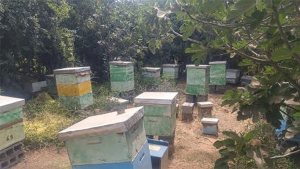
In Abdullah’s breeding apiary I got to experience the gentle nature of Apis Mellifera Sahariensis. Their heat tolerance and serene productivity were impressive.
After poking through a few hives and looking for queens (which were dark colored), we stood by the vehicles and talked shop over chunks of oozing and divine comb honey. And thanks to Mann Lake ltd. who donated some queen rearing supplies, I was able to gift each of the beekeepers with a spring action grafting tool and some JzBz grafting cell cups and queen cages. The beekeepers were thrilled to learn about American queen rearing techniques. And I was thrilled to learn about their efforts to preserve their endemic honey bee strains and Moroccan migratory honey production.
Our trip continued to expose us to all sorts of delights- both in and out of the beeyard. We travelled to Marrakech and visited several souks (markets). We enjoyed the national dish – couscous, which his customarily eaten with one’s right hand. And also got to experience a hammam – a bath house where for a small fee, one can be scrubbed with special soaps and oils. And of course, we perused stands, and aisles filled with exquisite varietal honeys, including origan (oregano), jujube, rosemary, eucalyptus, citrus, and desert wildflower.
We met our second group of beekeepers near Agadir, which lies to the south. Here we were invited by Abdullah and his family to visit his apiary in a copse of fig trees. He is an aspiring bee breeder and was thrilled when I gifted him another set of queen rearing supplies donated from Mann Lake, ltd. He shared that his dream is to learn instrumental insemination so that he can better preserve his area’s endemic strains.
We then ventured on to visit several additional towns. Sadly, our hosts had a family member pass away during our last few days so Tara and I decided to head to Tangiers to occupy our time and to respectfully allow our hosts some time to tend to family matters. We had a fantastical time in Tangiers meeting other tourists and Moroccans. I got to speak Spanish which was helpful in that my French is limited- though I love trying. We visited Chefchoua, the Blue City – which is where I found local beekeepers selling their exquisite honeys next to a waterfall and in the town center.
The bees were quick to find the sweet rolls and pastries in the bakery shops. Patrons did not seem phased to see bees swarming the sticky sweet rolls. In fact, it became a testament to the pastry shops – if the bees were attracted, then it must be good stuff. And indeed it is. Morocco is a delight. It is sophisticated, historical, colorful, flavorful, and bountiful. The bees in these enchanting lands have adapted to such diverse and adverse landscapes. As have the beekeepers.
Efforts to coordinate additional technical exchanges is underway. Mr. El Kharrazi and his brother Mr. Brahim Benomar have begun discussions with the Moroccan government to host additional trainers and to include researchers with American and Moroccan universities. I truly hope they are able to continue these cross cultural and technical exchanges. I dream of returning and learning more about their native honey bee breeding programs and eating more delicious honeys.
Melanie has been keeping bees for 20 years, first starting as a Peace Corps Volunteer in South America. She serves as an international consultant on sustainable beekeeping and is an avid writer and consilience researcher. She can be reached at ziaqueenbees@hotmail.com.







